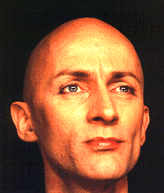Richard O'Brien |
Born March 25 1942 - Cheltenham, England
O'Brien left school at 15, after a less than happy or successful time. To please his parents, he enrolled in agricultural college, but spent every moment he could writing songs and soaking up movies at two local picture houses. The 1950s and early 1960s were the golden age of science fiction films. Often made on low budgets, with special effects that look distinctly un-special to the modern eye, movies like The Day The Earth Stood Still (1951), When Worlds Collide (1951), Tarantula (1955) and The Day Of The Triffids (1962) held a fascination for the young man. So did rock 'n' roll. In 1964, O'Brien headed for England. He was going to try to make it as an actor. His skill at riding horses, learned in the lush New Zealand countryside, got him some work as a stunt man on a couple of films, but O'Brien the actor was scarcely setting London alight. Meeting of mindsHis first real break came in 1968, with a small part in Sean Kenny's production of Gulliver's Travels, at the Mermaid Theatre. In 1969, he joined the touring company of Hair, meeting Tim Curry in the process, then in his first acting job in the London production. A part in Jesus Christ Superstar (1972) followed. O'Brien was due to take over the role of Herod, but it was not to be. 'I went on for one night and was terrible,' he remembers. Rather than return to the chorus, he quit. But Superstar was important, because that was where Richard O'Brien met Australian director Jim Sharman. Sharman gave him his next chance, as Willie the Space Freak, in Sam Shepard's play The Unseen Hand (1973), at the Royal Court's Theatre Upstairs. O'Brien had used his latest spell of unemployment to start work on his own show, and he was fascinated to find that Shepard's play drew on a lot of the material that was his inspiration - science fiction, horror movies and comics. That gave him the courage to broach with Sharman the subject of his own musical. The rest, as they say, is history. No man's landThe Rocky Horror Show's success took everyone by surprise, including O'Brien. But he claims it failed to make him rich and it certainly failed to ease his life personally or professionally. At the height of the show's success, his marriage to actress Kimi Wong, whom he had met in Hair, broke up, and he was left in Los Angeles, playing Riff-Raff by night and looking after their baby by day. His second wife, Jane Moss, a costume designer, brought him two more children and a greater degree of personal stability but, in his 40s, O'Brien entered analysis in an attempt, as he put it, 'to grow up'. Partly because of the sexual dimension of Rocky, O'Brien's own sexuality has always been under the media spotlight. He dislikes terms like heterosexual, homosexual or indeed bisexual, describing himself as 'confined to a life in no man's land'. Meanwhile, his attempted follow-ups to The Rocky Horror Show, like T. Zee (1976) at the Royal Court, Disaster (1978) and the movie Shock Treatment (1981), have not been successes. Top People, his 1984 musical, closed after less than a week. But Richard O'Brien has developed his career as an actor with parts in films including Derek Jarman's Jubilee (1978), which also featured Little Nell, the original Rocky Horror Columbia, Revolution (1985) and, most appropriately, Flash Gordon (1980). As presenter of the British television series The Crystal Maze (1990-94), Richard O'Brien finally found himself once again at the helm of a hit. |
 Richard 'Ritz' O'Brien was born Richard Smith in 1942 in the English
country town of Cheltenham. (He later took his mother's maiden name because
there was already an actor called Richard Smith.) The family emigrated
to New Zealand when he was just 10 years old.
Richard 'Ritz' O'Brien was born Richard Smith in 1942 in the English
country town of Cheltenham. (He later took his mother's maiden name because
there was already an actor called Richard Smith.) The family emigrated
to New Zealand when he was just 10 years old.